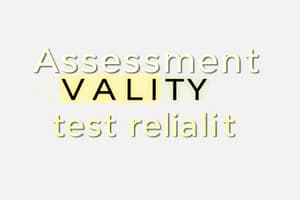Podcast
Questions and Answers
What does concurrent validity assess when comparing two tests?
What does concurrent validity assess when comparing two tests?
- How Test A correlates with an accepted measure like Test B (correct)
- The accuracy of Test A in isolation
- The ability of Test A to predict future outcomes
- The historical performance of Test B over time
Which statement best defines predictive validity?
Which statement best defines predictive validity?
- It evaluates a test's performance at the time of administration.
- It solely focuses on past test scores of individuals.
- It measures the relationship between current test scores and future outcomes. (correct)
- It requires the collection of demographic information of the test-takers.
What is a significant factor that influences incremental validity?
What is a significant factor that influences incremental validity?
- The historical background of the test to be used
- The number of predictors included in the assessment (correct)
- The items that constitute the test itself
- The uniqueness of the population being tested
Which of the following is NOT a criterion for evaluating the validity of a test?
Which of the following is NOT a criterion for evaluating the validity of a test?
What must validity coefficients provide to be useful?
What must validity coefficients provide to be useful?
Which example illustrates the concept of concurrent validity?
Which example illustrates the concept of concurrent validity?
What is the primary purpose of validity in psychological testing?
What is the primary purpose of validity in psychological testing?
When examining validity coefficients, they should generally be considered high enough to enable what?
When examining validity coefficients, they should generally be considered high enough to enable what?
Which type of validity assesses how well the content of a test represents the behavior it aims to measure?
Which type of validity assesses how well the content of a test represents the behavior it aims to measure?
Which of the following is NOT a characteristic of construct validity?
Which of the following is NOT a characteristic of construct validity?
What role does Test B play in the validation of Test A?
What role does Test B play in the validation of Test A?
What does 'face validity' primarily refer to?
What does 'face validity' primarily refer to?
Which of the following types of validity can be described as the 'umbrella validity'?
Which of the following types of validity can be described as the 'umbrella validity'?
In terms of validity evidence, who is primarily responsible for providing supporting documentation?
In terms of validity evidence, who is primarily responsible for providing supporting documentation?
Which of the following is an example of criterion-related validity?
Which of the following is an example of criterion-related validity?
What is the role of inference in the context of psychological assessment?
What is the role of inference in the context of psychological assessment?
What does a 'false positive' indicate in psychological testing?
What does a 'false positive' indicate in psychological testing?
What is a 'false negative' in the context of psychological assessment?
What is a 'false negative' in the context of psychological assessment?
What is construct validity in psychological testing?
What is construct validity in psychological testing?
What does it imply if test scores correlate as predicted with scores on other tests?
What does it imply if test scores correlate as predicted with scores on other tests?
How does the selection ratio affect the interpretation of validity coefficients?
How does the selection ratio affect the interpretation of validity coefficients?
What is indicated by high scorers and low scorers behaving as predicted by a theory?
What is indicated by high scorers and low scorers behaving as predicted by a theory?
What does it mean if pretest and posttest scores differ as theoretically predicted?
What does it mean if pretest and posttest scores differ as theoretically predicted?
What is likely true if test scores for distinct groups vary as predicted by theory?
What is likely true if test scores for distinct groups vary as predicted by theory?
Flashcards are hidden until you start studying
Study Notes
Classical Concept of Validity: Trinitarian View
- Validity refers to the judgment or estimate of how effectively a test measures its intended purpose.
- Judgments are based on evidence regarding the appropriateness of inferences drawn from test scores, characterized as "acceptable" or "weak."
Types of Validity
-
Content Validity
- Assesses if a test adequately samples the behavior it aims to measure.
- Example: An assertiveness test should encompass a wide range of assertive behaviors.
-
Criterion-related Validity
- Evaluates a test's score against a standard, known as the criterion.
- Concurrent Validity: Compares test scores obtained simultaneously to determine correlation with another established test.
- Predictive Validity: Assesses how well a test's scores can predict outcomes or measures in the future.
-
Construct Validity
- Viewed as the "umbrella validity," encompassing all other forms of validity.
- Evaluates the appropriateness of inferences based on the test scores regarding the underlying construct.
- Two subtypes include:
- Convergent Validity: Correlation of test scores with other measures of the same construct.
- Discriminant Validity: Differentiates between distinct constructs to confirm distinctiveness.
Inference and Validation
- Inference is the logical conclusion drawn from test scores.
- Validation involves the gathering and evaluation of evidence to confirm validity.
- Test developers are responsible for providing validity evidence within the test manual.
Criterion
- Serves as the standard for evaluating test scores, addressing its purpose and context.
- Example: When examining athleticism, membership in a health club can be a validating criterion.
Predictive Validity
- Obtains test scores at one time, with criterion measures gathered later.
- Measures the accuracy of test scores in predicting future behavior or outcomes.
- Important factors for evaluation include validity coefficients and context for decision-making.
Incremental Validity
- Refers to the additional value that comes from using multiple predictors in assessment.
- Determines the effectiveness of supplementary predictors based on the situation.
Misses During Testing
- False Positive: Incorrectly predicts a characteristic or attribute is present.
- False Negative: Incorrectly predicts a characteristic or attribute is absent.
Evidence of Homogeneity
- A valid test measures a single construct.
- Test scores may vary predictably based on age, time, or experimental manipulation.
- Differences between pretest and posttest scores support the construct's validity if they align with theoretical predictions.
Studying That Suits You
Use AI to generate personalized quizzes and flashcards to suit your learning preferences.




